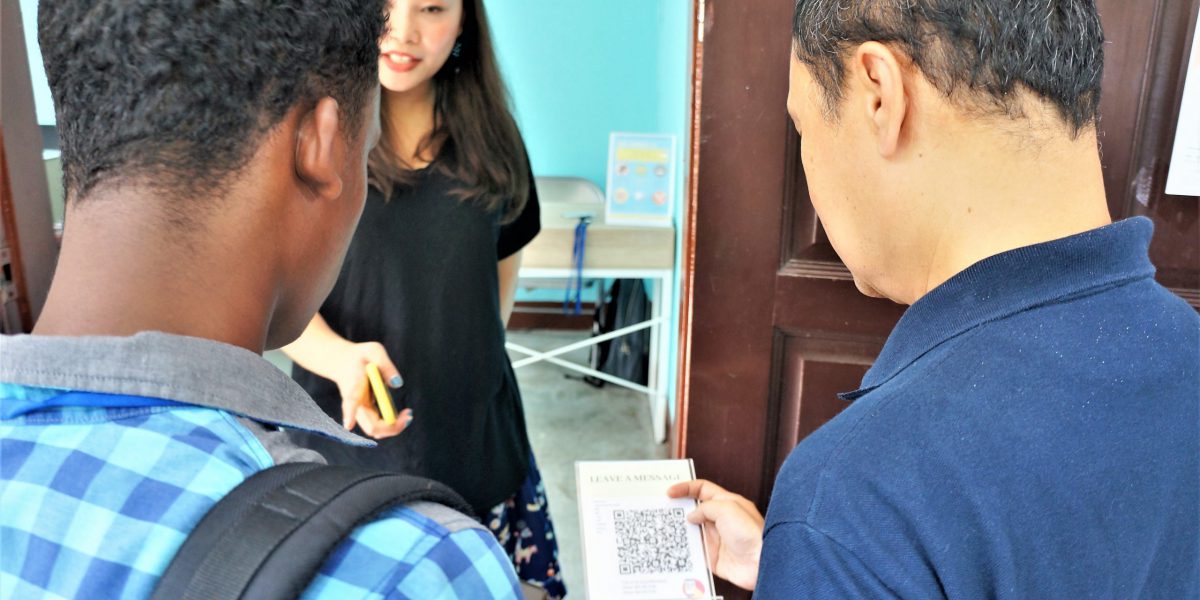Asia Pacific: Meeting with Fr Tony Moreno SJ, President of the Jesuit Conference of Asia Pacific
08 November 2018

Bangkok, 12 November 2018 – Last month, Louie Bacomo, Regional Director of Jesuit Refugee Service (JRS) Asia Pacific, welcomed JCAP President Fr Antonio Moreno SJ for a short visit in Bangkok. Filipino Jesuit Priest, Fr Antonio Moreno SJ became in 2017, President of the Jesuit Conference of Asia Pacific (JCAP). Before taking this position, he was the Provincial of the Philippines and President of the Jesuit University Ateneo de Zamboanga, in southern Philippines. Holder of a PhD in Development studies, he knows well the challenges of JRS’ work. He took some time to visit our Urban Education Project, chat with our team in Thailand and answered some of our questions:
Fr Tony, what is the Jesuit Conference of Asia Pacific?
There are 6 Conferences around the world. The Jesuit Conference of Asia Pacific covers seven provinces, three regions and two missions. One main concern of the Conference is collaboration. Indeed, JCAP exists to promote not only a collaboration between the Jesuits and ministries within the Conference but also among the Conferences.
In JCAP, which is based in the Philippines, we work on different concerns such as interreligious dialogue with Buddhists and Muslims, youth, migration and environment, secondary and higher education, research, the Ignatian spirituality, etc…
What is the strategy of JCAP?
The apostolic plan focuses on 3 issues: restructuring of governance among the JCAP units; work on priority areas like migration/refugees, youth, interreligious dialogue and reconciliation with creation; and formation of Jesuits and mission partners These issues are still very pressing and we will certainly consider them to be in our next plan as well.
Capacity building of Myanmar, Cambodia and East Timor is also very important to JCAP.
What are the possible points of collaboration between the missions of JCAP and JRSAP?
It is very important for Jesuit-led organizations to collaborate together to refine the mission of each organisation and avoid overlapping of works.
Jesuits are well settled in the region, even in some parts where JRS Asia Pacific is not there. Jesuits are on the ground and can report to JRSAP if there is an urgent need for refugees. They can be the ones alerting JRS of a dire situation and ask for a needs assessment in a particular area. JRSAP can conversely give information to JCAP since they are involved in refugee issues. JCAP would like to collaborate with JRSAP on certain issues especially concerning the Rohingya refugees and more generally on migration issues.
JRS already collaborates with the Jesuits in the region through a program of personnel exchange. Numerous JRS country offices in Asia Pacific actually employ Jesuits in their programs on the ground. Either scholastics or priests or brothers can get involved in JRS.
Moreover, JCAP and JRS Asia Pacific missions are intertwined on some issues such as migration. We want to contribute as much as we can on this. Migration is a big issue in our region, but not only in Asia Pacific. It’s also a global issue that needs a global response. Xenophobia is on the rise everywhere, with right-wing governments coming more and more to power. Unfortunately, refugees will bear the price of the complexity of this issue.
From your point of view, what are the challenges of JCAP?
In Asia Pacific, we have to face multiple challenges. One of them would be the influence of China. China is getting more influential than ever in the region and in the world. We have to be aware of this power and its implications and see how we can engage the growing influence of China.
In Asia Pacific, migration is also a big challenge. Migration can mean migrant workers, but also refugees or even trafficking. For example, the Philippines is one of the main exporters of human capital. A lot of migrant workers come from there and they need support in this endeavour. Refugees are also all over the region and we can’t ignore one of the world’s biggest exoduses that came from Myanmar to Bangladesh last year.
On the environment side, Asia Pacific is prone to all sorts of natural disasters. Lastly, we witnessed many earthquakes in Indonesia. In Sulawesi, an earthquake and a tsunami killed a lot of victims. JRS Indonesia is also working there to respond to that humanitarian crisis.
Another challenge is that only 7% of the population in Asia Pacific is Christian. There is need for interreligious dialogue. There is also a need to promote the vocations, and to inspire the younger generation. We want to prepare people and train the next generation of priests and brothers for leadership.
Finally, safeguarding children is also a serious issue in the Catholic Church. This issue does not only concern the US, South America or Europe. This issue can be found anywhere especially if safeguarding protocols are not implemented effectively. There is a need of a better protection system for children worldwide.

